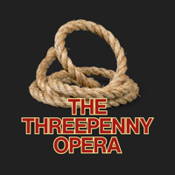
Overview
Synopsis
The Threepenny Opera is a biting satire of the post-war rise of capitalism, wrapped up in Weill's jazzy score, and the tale of Macheath (Mack the Knife), a debonair crime lord on the verge of turning his illegal empire into a legitimate business.
When Macheath marries young Polly Peachum, her father is enraged. Jonathan Peachum controls the beggars of London, and he strives to get Macheath hanged. Unfortunately for him, the chief of police is an old friend of Macheath’s.
Nevertheless, Peachum exerts considerable political influence, and eventually Macheath is arrested and imprisoned. He escapes, only to become imprisoned once more. Luckily, a hard-riding messenger from the Queen arrives at the last minute to pardon Macheath and to issue him a baronetcy.
Although Elisabeth Hauptmann (Brecht’s lover at the time) provided most of the book and in fact conceived the project, Bertolt Brecht did his best to conceal this and is usually given full credit for the script and lyrics of Threepenny. Songs from Threepenny have become classic standards, including “Pirate Jenny” and most notably, “Mack the Knife,” which has been covered by everyone from Frank Sinatra to Michael Buble.
Show Information
Context
The Threepenny Opera was created in 1928 by playwright Bertolt Brecht and Elisabeth Hauptmann with music by composer Kurt Weill, and it quickly became one of the most influential works of twentieth-century theatre. It was adapted from John Gay’s eighteenth-century ballad opera The Beggar’s Opera, which had originally satirized the corruption of London’s upper classes. Brecht and Weill reimagined the piece for their own turbulent times in the Weimar Republic, blending popular music, jazz, and
to read the context for The Threepenny Opera and to unlock other amazing theatre resources!Plot
Set in Victorian London on the eve of Queen Victoria’s coronation, The Threepenny Opera opens with the “Ballad of Mack the Knife,” a song that introduces Macheath, the notorious criminal known as Mack the Knife, and warns of his dangerous charm. In Soho, Jonathan Jeremiah Peachum runs a business that outfits and organizes beggars, taking a cut of their earnings. His daughter Polly, however, disrupts his plans by secretly marrying Macheath. Their wedding—staged in a horse stable and complete
to read the plot for The Threepenny Opera and to unlock other amazing theatre resources!Characters
| Name | Part Size | Gender | Vocal Part |
|---|---|---|---|
|
Lead |
Male |
Baritone |
|
|
Lead |
Female |
Soprano |
|
|
Supporting |
Male |
Bass |
|
|
Supporting |
Female |
Alto |
|
|
Supporting |
Male |
Baritone |
|
|
Supporting |
Female |
Mezzo-Soprano |
|
|
Featured |
Female |
Mezzo-Soprano |
|
|
Featured |
Male |
Spoken |
|
|
Featured |
Male |
Baritone |
|
|
Featured |
Male |
Spoken |
|
|
Featured |
Male |
Spoken |
|
|
Featured |
Male |
Spoken |
|
|
Featured |
Male |
Spoken |
|
|
Featured |
Male |
Spoken |
|
|
Featured |
Male |
Tenor |
|
|
Ensemble |
Either Gender |
Soprano, Mezzo-Soprano, Alto, Tenor, Baritone |
Songs
Prelude
- Overture
- The Ballad of Mack the Knife – The Street Singer
Act 1
- -Peachum's Morning Choral – Peachum, Mrs Peachum
- Instead of Song – Peachum, Mrs Peachum
- Wedding Song – Four Gangsters
- Pirate Jenny – Polly
- Cannon Song (“Army Song”) – Macheath, Brown
- Love Song – Polly, Macheath
- Barbara Song – Polly
- First Threepenny Finale – Polly, Peachum, Mrs Peachum
Act 2
- Melodrama – Macheath
- Polly's Song – Polly
- Ballad of Sexual Dependency – Mrs Peachum
- Ballad of the Pimp– Jenny, Macheath
- Ballad of the Pleasant Life – Macheath
- Jealousy Duet – Lucy, Polly
- Aria of Lucy – Lucy
- Second Threepenny Finale – Macheath, Mrs Peachum, Chorus
Act 3
- Song of the Insufficiency of Human Struggling (“Life’s a Bitch”) – Peachum
- Reminiscence
- Solomon Song – Jenny
- Call from the Grave – Macheath
- Grave Inscription – Macheath
- Walk to Gallows – Peachum
- Third Threepenny Finale – Brown, Mrs Peachum, Peachum, Macheath, Polly, Chorus
A song with an asterisk (*) before the title indicates a dance number; a character listed in a song with an asterisk (*) by the character's name indicates that the character exclusively serves as a dancer in this song, which is sung by other characters.
Monologues
Scenes
Key Terms
Sorry! We do not currently have terms for this guide.
Videos
Quizzes
Themes, Symbols & Motifs
THEMES
Corruption
One of the central themes
to read about the themes, symbols and motifs from The Threepenny Opera and to unlock other amazing theatre resources!Quote Analysis
_“What is the robbing of a bank compared to the
to read our analysis of select quotes from The Threepenny Opera and to unlock other amazing theatre resources!